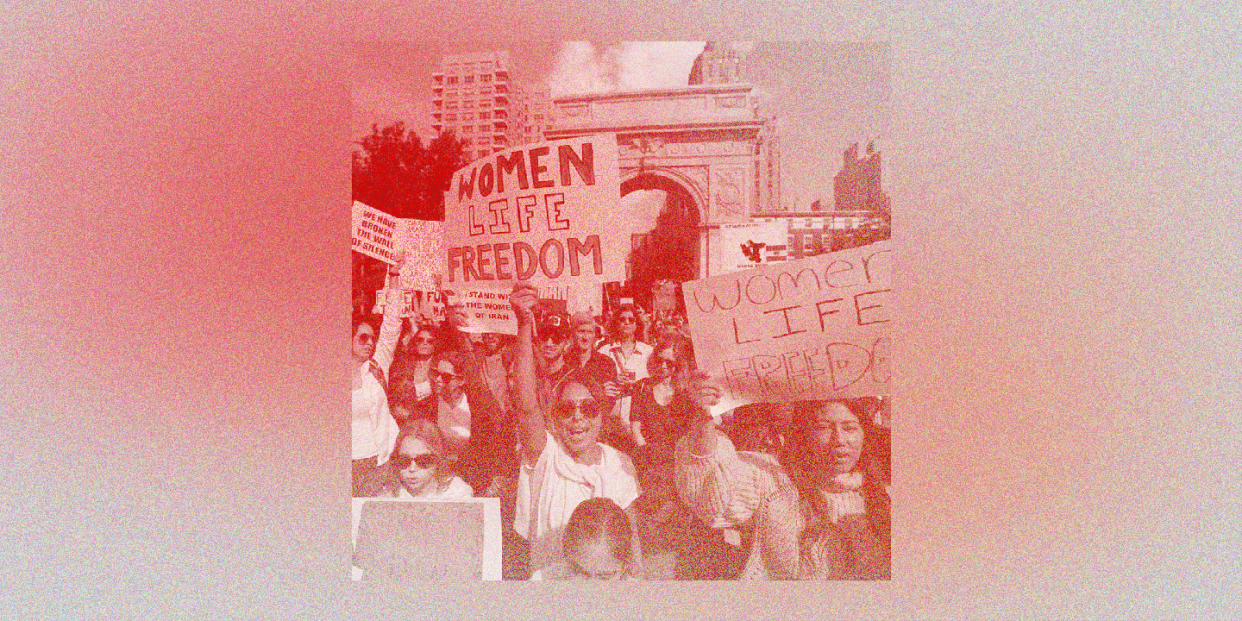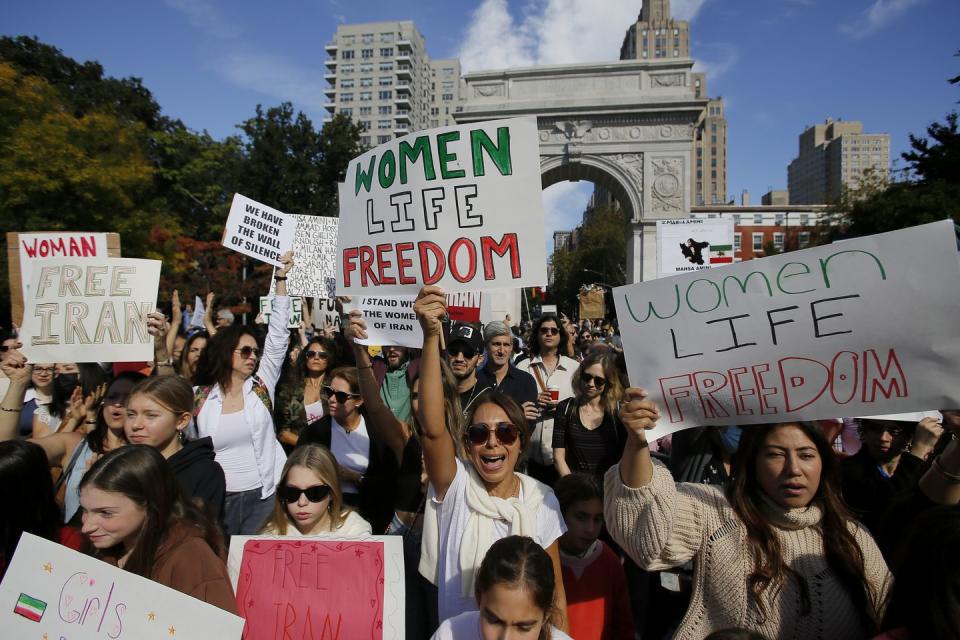One Simple Way to Help Women in Iran

On September 16, Mahsa Amini, a 22-year-old Kurdish Iranian woman, died after being detained by Iran’s so-called morality police. Her death ignited a long-simmering anger in the people of Iran and sparked a revolution, largely led by young women, demanding an end to the Islamic regime. For the past six weeks, they’ve faced brutal government crackdowns, but they remain undaunted, adopting the Kurdish rallying cry: "Woman. Life. Freedom."
Harper’s BAZAAR has asked celebrated Iranian writers, artists, journalists, and more to help make sense of this moment when so much is at stake. Their stories are collected here, with more to come.
If you've at all tapped into the ongoing protests against the Iranian government sparked in reaction to the death of 22-year-old Mahsa Amini, then you've likely seen a viral GoFundMe campaign pop up on your Instagram feed.
The campaign, which was launched by the nascent Iranian Diaspora Collective in early October, intends to raise enough money to purchase highly trafficked billboards and advertisements that will raise global awareness of the protests and, hopefully, inspire more mainstream media coverage. Without the means to send money directly to protesters due to U.S.-imposed sanctions, 100 percent of the funds will instead go toward advertising the movement abroad.
Since its launch, the campaign has surpassed its original goal of $250,000; as of the time of this writing, donations from more than 5,500 people have reached more than $390,000.
Shortly after women stormed the streets of Iran to demand an end to the country's regime—in the process, also claiming their right to bodily autonomy and economic justice—the Iranian Diaspora Collective assembled. Members hail from different backgrounds, creeds, genders, and industries. Many have chosen to keep their identities anonymous, for fear of retaliation for their families and loved ones still living in Iran. But one thing unites them: their faith that the vision of the women-led Iranian revolution will be fulfilled.
Iranian Canadian actress Tara Grammy is a member of this diasporic coalition. She was born in Iran and left the country with her mother when she was six years old, but would return to spend her summers in Tehran nearly every year thereafter. Grammy infuses her Iranian heritage into every facet of her work as an actor, but it's also this deep love for her culture that has kept her from returning home. At 22 years old, she co-wrote, produced, and starred in Mahmoud, a one-woman show that reckons with her identity as someone living in the Iranian diaspora. Though the play earned her recognition and even a nomination for Canada's prestigious Governor General's Award, its political nature has inhibited her from returning to Iran ever since, she says.
"Imagine how bad it is that we would leave that beautiful place, that I would choose to not go back there in protest for 12 years," she says. "I didn't see my grandparents get old and die. I didn't get to see my sister grow up. My dad's hair turned white. I didn't see any of that because of a choice that I made. But I knew that being this voice was more important than anything else."
We spoke further with Grammy about the collective's campaign, the ongoing battle for visibility, and her hope to one day return to the country she was born in.

How did the Iranian Diaspora Collective start?
It's been kind of like how you would invite people to a party that's getting really big. Like, "Okay, this person's cool. Let's invite them. Oh, I know this guy." We just pooled all our resources. Everybody has used their connections to help this campaign be what it is now. Someone will be like, "Hey, does anybody have a connection to Christiane Amanpour?" And one person will be like, "Oh, I know someone who was on her show; let me contact them." It's been like that. It's one WhatsApp group, and everybody just puts all the information and all their resources together.
What was your reaction when the protests in Iran began?
It feels like someone close to me died. I'm filled with hope and anger and grief.
I immediately started obsessively posting about it—everything that I could. They cut off the internet in Iran immediately after it all started happening, so we're like, "Okay, I guess we're the internet now." In the beginning, people would send me videos from Iran to my Instagram, videos of people on the street, like, being shot at and protesting. It was insane. I felt like CNN at the time. It's just gotten bigger and bigger.
Then I was part of the committee that organized the big protest in L.A. Twenty thousand people showed up, and I was so excited the morning after the protests. I woke up ready to see like, "Oh, CNN probably covered it. We're gonna be on the news." And it was nowhere. Nobody talked about the 50,000 people that came out in Toronto, 20,000 people in L.A. Hundreds of thousands of people all over the world came out on October 1 to protest against what's happening in Iran, and no news network covered it. We were all like, "Where the fuck is the news? Where are you?"
A huge part of this campaign is about making people aware of what's happening in Iran. Why do you think visibility is so important for a movement like this? What kind of impact do you hope the billboards and advertisements will have?
I hope people can, I don't know, I guess give a shit about it. [Laughs.] There's a nicer way to say it. I just hope people give a shit. To be honest, I'm a little disillusioned with everything right now, because I feel like Instagram in and of itself is kind of like one big billboard.
And whenever I drive past those PETA billboards, they're so effective. I'm always like, "Shit, they're kind of right. Should I be vegan?" It's effective. It makes you think, especially when you're driving and you're not on your phone. It's like an extension of what we're doing on social media to bring awareness.
Also, my hope is that every single person in the world knows and understands what's happening in Iran. Imagine the kind of pressure that would put on the government to stop doing it? And also, the power it gives these powerless people. If the whole world is talking about everything that's happening to you, that's some power. That's some strength to keep fighting.
As human beings, one of the main things that we want is to be seen, right? We wanna be seen, and we wanna be heard, and cutting off the internet is not letting people be seen or be heard. This is our way of being like, "Hey, we see you, we hear you." So this is one big form of protest against the government, by putting it in public spaces. You can't look away. You can scroll past it on your phone, but if you're stuck in traffic, that billboard's not going anywhere.
What's the significance of posting about these protests on social media?
On International Girls Day, I talked to an all-girls school, and I told them the way that they can help is by posting. That's what we tell everybody: Just post about it. Literally, there's nothing you can do. Just post about it. Just tell people about it. Let's fill the world with information. The more people know, the less they can do this to them in Iran.
What's happened now is it's shown us how impactful social media is. It's so impactful. There's so many different things that wouldn't have happened if we weren't online just screaming at the top of our lungs for people to hear us.
How do you fight feelings of helplessness?
People ask me that a lot. I did an Instagram Q&A, and 90 percent of the questions were like, "How are you staying sane?" And my answer in the end was, "I'm not okay. And that's okay." I'm not okay. I'm not sleeping. I'm not eating properly. Today's my five-year anniversary with my husband; I honestly completely forgot about it.
Right now, everything's at a standstill, but it's a worthy standstill. The pain, the crying—all of it is worthy if, in the end, this means that I could go back there one day. Maybe I could go visit my grandparents' graves—that means everything. That's all I've ever dreamed of. And this is the first time I have hope that it could happen in 12 years.
It's the hope that keeps me going. And then, there are some days where it's just like, I don't know, we just have to keep going for them. If they're fighting, I'm fighting.
What do you wish people knew more about when it comes to Iran?
This is a terrorist regime. This is a terrorist regime committing human rights violations in one of the most resourcefully rich countries in the world. Iran is very rich in resources. Iran is very rich in culture and history. And a blind eye has been turned on these human rights atrocities that have been happening for 43 years. Iran didn't used to look like this.
This interview has been edited and condensed for clarity.
You Might Also Like
